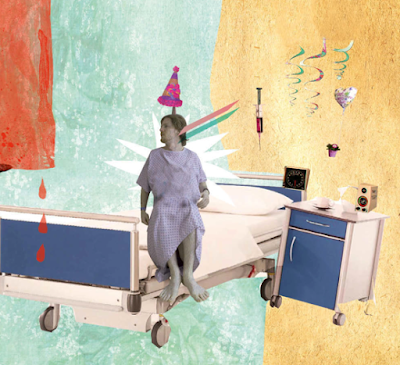Breakfast Meetings with the Universe
After they took off the bandages, I looked
at myself in the mirror. Half my head was bald. Above my left ear was a raw,
four-inch scar that looked like a punched mouth stitched shut.
I was like something out of an ‘80s horror flick. Frankenstein’s monster with a punk hairdo.
It didn’t bother me. At that point, I was
enjoying the little things, like breathing.
If you need neurosurgery, the expression “I need this like I need a hole in the head” no longer
makes sense. In fact, a lot of things stop making sense. It can be oddly uplifting to go
weird for a while.
After they cut my head open, I woke up with
bits of my memory edited out. I couldn’t remember the names of friends and colleagues. One morning, I was handed a newspaper. The lead
story was badly written. The news didn’t make any sense. I couldn’t understand
who was doing what, when, or why.
The news was: I couldn’t read and write
properly.
Although I could still speak and understand
English, it was seriously faulty. I called the hospital a hotel, because it
began with H and ended with L. I couldn’t remember words for ‘drawer’ or
‘cucumber’ and other everyday things. The world of objects felt like a
lot of tin cans with the labels ripped off.
The doctors told me it would all come back.
The tumour had affected my left temporal lobe, the language centre of the
brain. But they’d only cut out a small chunk. I would be back to
normal within a few months, they said.
I was exhausted. I slept. I felt like bits of myself, not just my memory, had been deleted. And then something strange took its place.
There is no language to describe it. At
least, there’s no language to describe it without sounding like you’re on acid
or you’ve just spent six months at a dodgy ashram. Maybe what happened to me can
only be experienced when you don’t have language. But the morning after I was
moved out of the ICU, the sunrise filtered through the curtains into my room,
stretched across my bed, woke me up, and time stopped.
Blinking in the early light, I reached up
and touched the wall above my bed. The wall was alive.
Everything in the universe was alive, and
all of it had come to visit me in my room. There was no beginning and no end. Everything
that ever was and will be had become a single, sublime moment of unconditional love,
and the moment was now.
I woke up in the same way every morning, in
a spectacular communion with the ineffable.
I tried to keep quiet about it. I hid in
the bathroom so people didn’t see me crying – no sobs, just quiet, rolling,
grateful tears – and by mid-morning, everything would be back to normal.
After lunch, the joy would be replaced by explosive
crankiness until I got some sleep.
I finally mentioned it to the neurologist.
He looked embarrassed.
“It’s the left temporal lobe,” he said.
“People report strange experiences. I wouldn’t worry about it.”
There wasn’t time to talk about it. He
needed to prep me for outpatient radiation therapy, and in the waiting room
behind me there were dozens of people with even worse problems. I was lucky to
have a bed; some cancer patients slept on the street.
It felt like I was going crazy. But if this
was a kind of insanity, I didn’t mind.
I was discharged from hospital. The feeling
continued for a few weeks, gradually declining in intensity as the names and
words came back.
One morning, I was in a Croma department
store looking for a new fridge-freezer. Despite all the shiny surfaces,
everything seemed drab. The ineffable had finally effed off.
Historically, foreigners in India have got
their spiritual kicks on the hippy trail. I’m the only one I know who got them
in hospital. It’s now four years later, and those experiences have never
returned. I’m still not sure how to categorise them. As far as I can tell there
are three possibilities: They were either side effects of neurosurgery, drugs
and stress, or breakfast meetings with the universe, or, somehow, both.
No, I haven’t gone all religious. But
despite the obvious and easy rational explanations, I just can’t – or maybe I just
won’t – rule out the possibilities. It seems like a foolish and self-limiting
thing to do, like denying that you’ve fallen in love or are deep in grief.
So I remain agnostic, and I have to leave
it open. But whether it was a bump on the brain, or the truth of the universe,
I don’t think it matters.
Because for a while it seemed as if – beneath
all the grinding and the cursing and the blood – everything really and truly is
all about love. And that is a blessed memory to have.

Comments